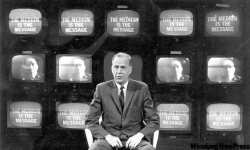
This is the attitude of an eternal now. It’s driven by this old chestnut – a journalist is someone who works for someone who buys ink by the barrel. The key to that sentence is the phrase “who works for someone.” Journalists are supposed to leave their minds and hearts at the door of the newsroom.
Reporters are taught to have no sense of history, or of the future. Mainly we’re taught to pretend we know nothing, and everything we’re told is equally valid. As a result, most reporting has no context, and we can’t call out stupid when it’s right in front of us.
That’s how Trump gets away with it. Any reporter who likens what he’s doing to Jefferson Davis or Adolph Hitler is accused of malpractice by agents of stupid at The New York Times. We’re just supposed to print what he says and repeat what he does, like good little stenographers. Then let Bret Stephens or Ross Douthat tell us what it means. Everything’s fine.
It’s even worse in business, which is my beat. Because we are taught to ignore the broad sweep of business history, we send readers down blind alleys. We pretend that making cookies is as cutting edge as writing software.
The past and the future have always been there in front of us. It was clear in 1979 that oil was taking over from manufacturing, but people reported from Detroit then as if that city could be saved. It was also clear that oil was a boom-and-bust business, but I was told to report from Houston that the boom would go on forever.

This is not uncommon in business. Managers who are headed for big things will be moved around the shop, taking roles in production, in supply, in distribution, marketing and finance. This is supposed to give them the perspective needed to run the whole business.
The problem with this is the loyalty it creates to the organization. People who rise in this way are narrow-minded. They’re focused entirely on their own company. They’re institutionalists. The winners are the change agents, people and companies that focus on doing things differently, and thereby seize the industry.

It happened because the Web changed the game. It was clear in 1994 that the Web wasn’t an advertising medium, yet that’s how publishers treated it. The Web is how business gets done. Everything a business does to interact with a customer can be done on this medium, from prospecting, to leading people down the sales funnel, to transacting business, supporting the customer, and handling returns. Everything a business does with its employees and suppliers can be done here as well.
Journalism is the business of organizing and advocating an industry, place or lifestyle. The Web did the organizing, and most journals lost their place to it. But advocacy is also important.
Journalists want to be true friends to our audiences, telling them what they need to know, not just what they want to know. Editors and publishers refused to let their journalists even attempt to do this, thinking they could save their shrinking advertising by being non-confrontational. This just made them useless.

To be truly customer focused, a journalist needs to walk around in the customer’s shoes. They need to see above what is going on today, see how the past fits into what’s happening, and look ahead.
Everything else is useless bullshit.
Yet that’s all our journalists have been delivering.
Why did local newspapers keep running AP stories and national features readers could just as easily get elsewhere? Why didn’t they focus solely on stories too small for AP, because they were local? It’s because they had an elevated, internally focused view of what they were doing.
If I can get it elsewhere on the Web, I don’t need to get it from you. In the age of the Internet that should have been the mantra of every publisher. Get me what no one else has, even if my readers are the only people who give a damn. Especially if my readers are the only ones who give a damn. Then you have something unique to sell, something you can run ads against.

Journalism is now faced with starting over. It can’t do that if it’s focused on itself. It can’t do that if it’s lost in the eternal now. It must be focused on its target reader, on their needs. It must advocate for those needs, by seeing what’s ahead for those people and giving loyal members an understanding of their homes, their industries, or their passions. It must provide more than copy, or video, or even charts. It must create services that enhance the connection between reader and writer.

That’s why journalists who want to survive in this business must see themselves as publishers, identify their own target markets and focus on them.
Because no one else will do it for us.










